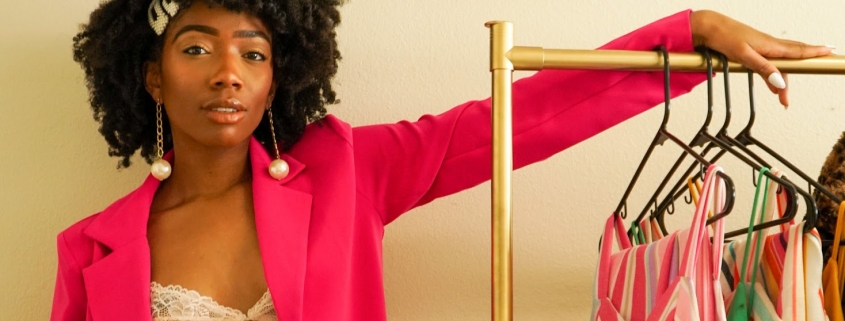Cut from the same cloth

For Alexis McDonald, fashion is a way to empower women. From age 5 she remembers visiting thrift stores with her grandmother — something that quickly piqued her interest in the industry. By age 8 she was already creating clothing designs in her composition book. Through her upcoming women’s boutique, McDonald said she wants to empower and pay homage to Black women by showcasing their historical and iconic styles.
Launching in April, Street Madonnas will serve as an online platform for both shopping and creating camaraderie among women consumers through conversations about fashion and style. The platform will feature a community page where users can share their thoughts through posts and forum discussions centered on offering style tips and opinions on fashion events.
Street Madonnas is a project that McDonald is working on outside of her studies in the Roski School of Art and Design. She said she wants to highlight trends Black women have pioneered throughout history, such as bamboo earrings and long acrylic nails, on Street Madonnas to make sure Black women receive credit where it is due.
“I wanted to create a website and a store that is content-driven versus sales-driven because I believe that once you have people hooked in onto your brand, then converting them to customers is really easy,” McDonald said.
Nigel Richardson, a former University of Miami classmate who met McDonald while they were both working as resident assistants at the school, said he has watched her creativity develop as she continues to break fashion norms.
“I’ve really seen her personal style evolve,” Richardson said. “She’s always trying to push the limits on things … explore different fashion trends but also trying to push the envelope — [trying not] to follow a trend that already exists but trying to start something herself.”
The concept for Street Madonnas is based on McDonald’s creative vision of integrating culture and fashion. Her business aims to create an online community through implementing elements of social media into her online boutique that allows users to interact with one another. She hopes to cultivate an online space for Black women to celebrate and archive their unique style.
“I want to make sure that Black women are given the credit that we are due,” McDonald said. “I want Street Madonnas to be a place where we can commune and talk about fashion. We can buy fashion. We can explore … what it means to us as a community but [also] allies [of Black women] as well.”
Using her University of Miami degree in electronic media, which is a hybrid of film and journalism, she is working on a USC master’s thesis in studio arts focusing on the exploration of her relationship with hip-hop as a Black woman. McDonald said she faced challenges developing her art at USC because of the lack of diversity in the student body and faculty, which she said makes it difficult for them to understand her experience as a Black woman.
“I have yet to meet an African American woman professor … in the arts program,” McDonald said. “I’ve had a lot of support for my ideas, but … I would like to be pushed and challenged a little bit more. I think [professors] really support my ideas — they just don’t really have the same perspective or the context that I have [as a Black woman].”
Jennifer West, associate professor at the Roski school and chair of Art in 4D, met McDonald during a studio visit in October 2019. Since then, West said she has seen McDonald’s progression as an artist through her current work on her master’s thesis hip-hop feminism, which examines the relationship between feminism and hip-hop culture. McDonald draws on inspiration from “video vixens” — female dancers in early-2000s music videos — and analyzed and recontextualized the images of these women.
West now sits on McDonald’s thesis committee, and they talk on a weekly basis to continue to develop McDonald’s thesis exhibition, which will open Feb. 27. Like Street Madonnas, McDonald’s thesis continues on with her exploration of the culture of Black women.
“She got access to this archive of this African American-based magazine that features women on the cover, which is part of her show,” West said. “She reached out and she actually got a substantial portion of this actual archive … she’s created this whole show around that.”
West said McDonald was passionate about exploring the African American experience through her art, be that through her work at USC or her work on Street Madonnas. Her work throughout her time at USC has largely focused on the empowerment of Black women, confronting the historical misogyny within the hip-hop community.
“I see her becoming part of a dialogue that’s going on around women and identity and race in artists working across the country,” West said. “She’s young, and I hope she continues to develop this practice and just start exhibiting.”
McDonald said she plans to use the clothing boutique as a way to honor fashion in the Black community. She cited hip-hop artists like Lil’ Kim and Salt-N-Pepa as style icons who broke barriers with their style as Black women.
“I want Street Madonnas to … pay homage to our culture,” McDonald said. “Making sure that it’s a place that archives, that honors that history of the way that Black women enjoy getting dressed and use dress as a form of expression and a form of agency and representation.”
Richardson said he understands McDonald’s creative vision, both as an artist and businesswoman, and noted her ambition and work ethic.
“I know that there are only more great things to come because when she puts her mind to something, she really makes sure that she follows through and that is successful,” Richardson said. “I think this Street Madonnas is the beginning of her just growing more into a digital media mogul.”

